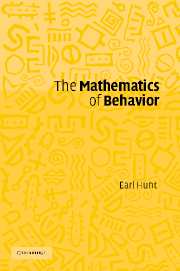Book contents
- Frontmatter
- Contents
- Preface
- 1 INTRODUCTION
- 2 APPLYING PROBABILITY THEORY TO PROBLEMS IN SOCIOLOGY AND PSYCHOLOGY
- 3 FROM PHYSICS TO PERCEPTION
- 4 WHEN SYSTEMS EVOLVE OVER TIME
- 5 NON-LINEAR AND CHAOTIC SYSTEMS
- 6 DEFINING RATIONALITY
- 7 HOW TO EVALUATE EVIDENCE
- 8 MULTIDIMENSIONAL SCALING
- 9 THE MATHEMATICAL MODELS BEHIND PSYCHOLOGICAL TESTING
- 10 HOW TO KNOW YOU ASKED A GOOD QUESTION
- 11 THE CONSTRUCTION OF COMPLEXITY
- 12 CONNECTIONISM
- 13 L'ENVOI
- References
- Index of Names
- Index of Subjects
- Frontmatter
- Contents
- Preface
- 1 INTRODUCTION
- 2 APPLYING PROBABILITY THEORY TO PROBLEMS IN SOCIOLOGY AND PSYCHOLOGY
- 3 FROM PHYSICS TO PERCEPTION
- 4 WHEN SYSTEMS EVOLVE OVER TIME
- 5 NON-LINEAR AND CHAOTIC SYSTEMS
- 6 DEFINING RATIONALITY
- 7 HOW TO EVALUATE EVIDENCE
- 8 MULTIDIMENSIONAL SCALING
- 9 THE MATHEMATICAL MODELS BEHIND PSYCHOLOGICAL TESTING
- 10 HOW TO KNOW YOU ASKED A GOOD QUESTION
- 11 THE CONSTRUCTION OF COMPLEXITY
- 12 CONNECTIONISM
- 13 L'ENVOI
- References
- Index of Names
- Index of Subjects
Summary
Many, many years ago, when I was a graduate student at Yale University, I attended Professor Robert Abelson's seminar on mathematical psychology. This was in the late 1950s, just as mathematical techniques were beginning to hit psychology. Subsequently I met Professor Jacob Marschak, an economist whose work on the economics of information was seminal in the field. After I received my doctorate in 1960 I had the great opportunity to work with Marschak's group at the University of California, Los Angeles. Marschak set a gold standard for the use of mathematics to support clear, precise thinking. It is now almost 50 years later, near the end of my own career, and I have yet to meet someone whose logic was so clear. I have had the opportunity to see some people come close to Marschak's standard, both in my own discipline of psychology and in other fields. This book is an attempt to let future students see how our understanding of behaviors, by both humans and non-humans, can be enhanced by mathematical analysis.
Is such a goal realistic today? Many people have deplored the alleged decline in mathematical training among today's college students. I do not think that that is fair. On an absolute level, students at the major universities arrive far better trained than they were 50 years ago. High school courses in the calculus are common today; they were rare even 25 years ago.
- Type
- Chapter
- Information
- The Mathematics of Behavior , pp. ix - xPublisher: Cambridge University PressPrint publication year: 2006



